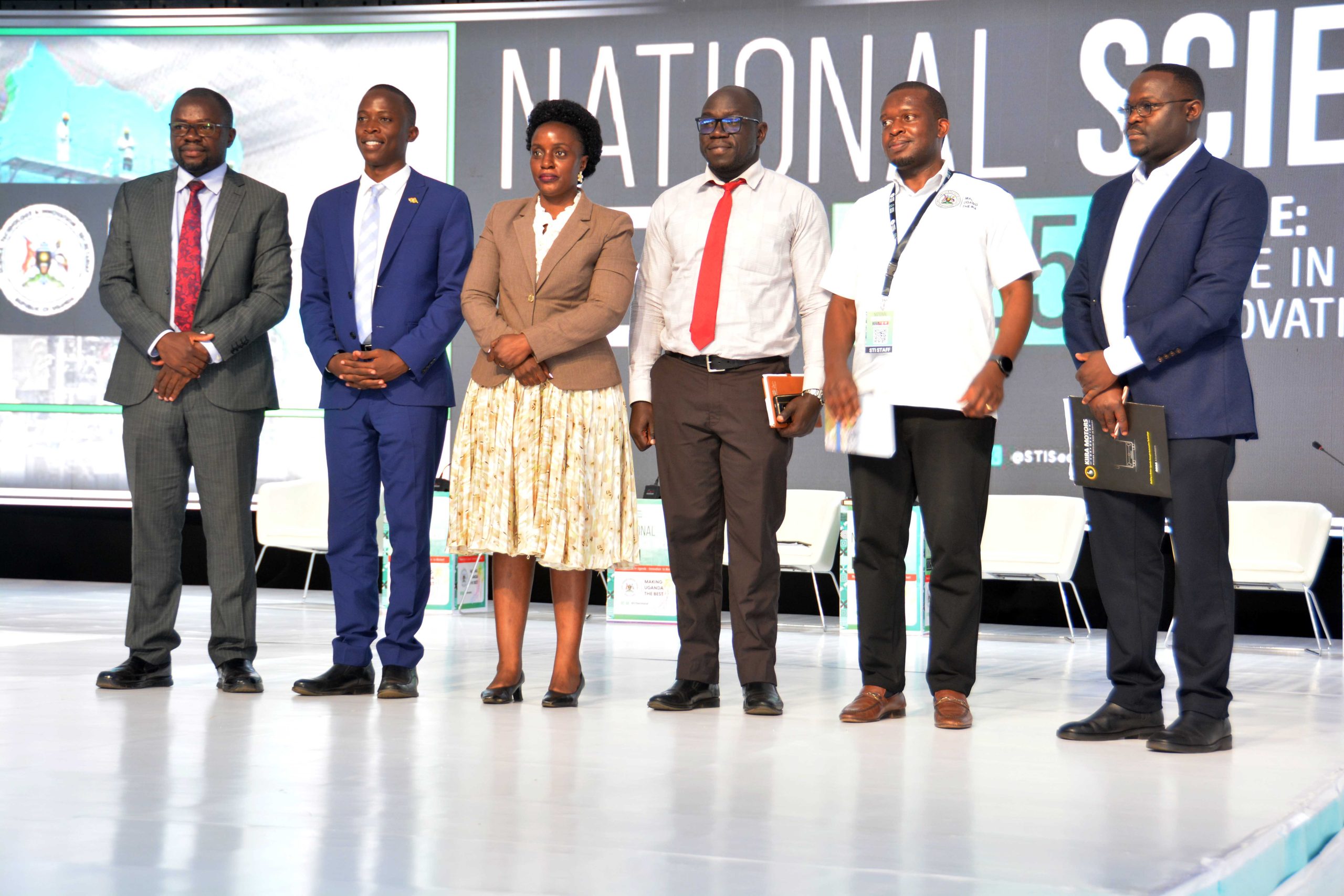Opening the policy day on Science, Technology, and Innovation Dialogue
In a bold move to bridge the persistent gap between economic policy and science-driven development, the Science, Technology and Innovation Secretariat under the Office of the President (STI-OP), in collaboration with Makerere University School of Economics, hosted the inaugural Policy Day as part of the fourth edition of National Science Week.
Held on 18th June 2025, under the theme, Fostering a harmonized understanding of the STI–Economy nexus to promote coordinated policy planning and implementation, the event convened top economists, policymakers, planners, and scientists to initiate a transformative dialogue on aligning Uganda’s economic strategies with the national STI agenda. The Policy Day marked a strategic turning point—aimed at fostering a shared vision for propelling Uganda from a USD 50 billion to a USD 550 billion economy by 2040—through a science-led, whole-of-government approach grounded in innovation, planning, and inter-sectoral collaboration.
Welcoming the participants to the fourth edition of the National Science Week and the inaugural Policy Day, Dr. James Kisaale, a member of the Advisory Council of the Science, Technology, and Innovation, acknowledged the strategic partnership with Makerere University School of Economics in convening the day’s policy dialogue.
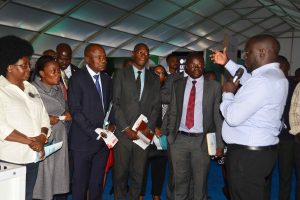
“STI devised a deliberate partnership with Makerere University to facilitate high-level policy dialogues, which bring together economists, government planners, private sector leaders, and development partners,” he stated.
In the same vein, he recognized the presence of the following institutions: The National Planning Authority, Parliament of Uganda, Bank of Uganda, Makerere University Business School, the Economic Policy Research Centre, the Ministry of Trade, Industry and Cooperatives, the National Council for Higher Education, and the Uganda National Council for Science and Technology, among others.
Dr. Kisaale emphasized that the Policy Day was conceived to foster a harmonized understanding of the nexus between Science, Technology, and Innovation (STI) and the economy—an imperative that is critical for coordinated policy planning and implementation in pursuit of Uganda’s transformation agenda.
In a keynote address on strategic alignment between STI and economics, Hon. Dr. Monica Musenero, Minister for Science, Technology, and Innovation, articulated Uganda’s journey toward building a knowledge-based economy driven by science, technology, and innovation (STI).
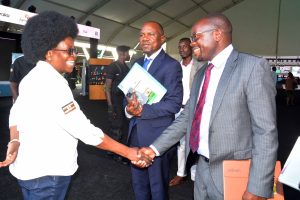
Dr. Musenero addressed the critical gap in the current education and research systems, highlighting how a number of sectors remain mere consumers rather than producers within the economy. She observed that the education system primarily prepares individuals to consume value-added products developed elsewhere, using mobility as a prime example. She explained that while Uganda imports cars and trains mechanics and drivers to maintain and operate them, the broader knowledge and innovation required to produce such technologies locally remain absent. This, the Minister of Science, Technology and Innovation noted, stems from economists and scientists being trained in limited aspects of the value chain, which leaves much of the vital process (that she referred) to as the “black box” unexplored.
Dr. Musenero elaborated that this lack of holistic understanding has perpetuated widespread ignorance and passivity. Many researchers produce detailed studies that either focus narrowly on raw materials or deepen the reliance on consumption, without contributing to value addition or product development. She revealed that only a mere 2.6% of research conducted in universities and institutions had any inclination toward developing a product, with the majority confined to basic research that often ended up with reports rather than innovation or commercialization.
She explained that researchers often measured success by the number of publications rather than real-world impact or commercialization. This disconnect, she argued, resulted in many promising prototypes being abandoned, with scientists losing interest once initial research was complete. She lamented the non-supportive research environment and noted that much externally funded research was aligned with foreign agenda and interests, which limited its relevance to Uganda’s economic development.

“Most researchers considered publication as the primary measure of success. When the government began funding research through UNCST, we observed a two-phase structure: Phase One focused purely on scientific research, while Phase Two began to explore technology development. Out of the 19 projects funded, 13 were abandoned right after producing promising prototypes. Their approach was simply to complete the research, write a paper, and move on. This revealed a research environment shaped by an agenda that did not support continuity, commercialization, or real-world application,” Dr. Musenero revealed.
Highlighting government interventions, Dr. Musenero described the strategic shift from a Ministry of Science to a more integrated national Science, Technology, and Innovation (STI) system. She pointed out that it was a deliberate move to foster cross-sector collaboration and align STI efforts with industrial value chains. This approach, she said, underpins the country’s vision to become a technologically advanced and innovative nation, a goal that is now deeply ingrained in the mindset of leaders and stakeholders involved in STI.
Dr. Musenero outlined the key pillars necessary for this transformation, including infrastructure, human capital, investment, supportive policies, and a robust ecosystem that nurtures innovation. She stressed the importance of a scientific approach to priority setting, flat organizational structures that encourage open challenge and ideas from all levels, and an ecosystem perspective that ensures no sector works in isolation. She cited the value chain approach as central to Uganda’s STI strategy, explaining how industries such as cotton have evolved to encompass numerous profitable sub-sectors, enabling scientific analysis and targeted investments.
Speaking about the STI journey as a process of categorizing and managing projects with tailored support, the Minister emphasized the need for integrity in research and product development to ensure quality and trust in outcomes. Dr. Musenero described STI not merely as scientific pursuit but as a philosophy focused on driving the economy forward through innovation, quality leadership, specialized governance, human capital development, and decentralization to make STI accessible beyond elite circles.
Dr. Musenero highlighted the industrial value chains prioritized by the government, including mobility, pathogen economy, aeronautics and space and infrastructure innovations. She pointed to practical examples such as the Kiira vehicle plant and the ongoing development of the pathogen economy park, which leverage existing research infrastructure and foster collaboration between ministries, research institutions, and industry. She emphasized the need for continuous research to address critical gaps that could impede
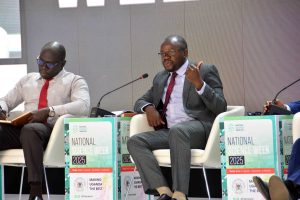
During the proceedings, the Dean, School of Economics, Makerere University, Dr. Ibrahim Mike Okumu, who is an Associate Professor of Economics, called for improved coordination, financing mechanisms, curriculum reforms to incorporate STI and the establishment of STI- information management and exhibition systems.
In his presentation on the Role of STI in the Economy, Dr. Eria Hisali, Associate Professor of Economics at the Makerere University and former Principal of the College of Business and Management Sciences (CoBAMS) underscored that STI is significant in enabling countries to diversify their range of goods and services while simultaneously reducing production costs through improved efficiency.
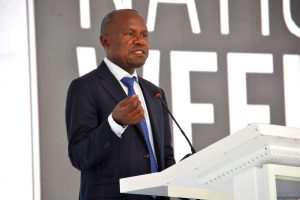
Prof. Hisali stated that Uganda is already tapping into several emerging sectors, including mobility, artificial intelligence, and what he termed the “pathogen economy.” In his view, these are signs of a growing innovation portfolio and their real value lies in how they boost productivity and drive long-term economic transformation. He emphasized that STI products such as vaccines or AI-powered solutions should not be viewed as ends in themselves, but rather as tools that address broader societal and economic problems.
“Science, Technology, and Innovation products (STI) are not ends end in themselves. Their true value lies in their ability to solve real-world problems. For instance, when you develop a vaccine, the goal is not merely the vaccine itself, but the solution it provides to a health challenge. We must view STI products through this lens as tools that contribute to broader solutions to pressing needs in society, economy, and environment,” he said.
Prof. Hisali stressed that STI is the only sustainable route to achieving real economic transformation. While short-term policies and investments may offer quick returns, he argued that enduring change can only occur when a country invests in the generation and application of scientific knowledge and technologies. He compared Uganda’s performance with that of industrialized countries, where STI-driven productivity accounts for a significant share of long-term growth. For instance, he cited historical data showing that in countries such as the United States, technological advancement and innovation had consistently played a decisive role in economic progress.
Uganda’s economy, he said, currently survives largely on heavy capital investments, such as infrastructure projects, which may not be sustainable in the long run. He revealed that for every 100 shillings invested in capital and labor in Uganda, only 88 shillings are generated in output which signify a highly inefficient system. Over the past three decades, he observed, Uganda’s productivity growth has stagnated at a dismal average of 0.1% per year. He clarified that these insights were not based on assumptions or models, but were extracted from real, verifiable GDP data.
Prof. Hisali attributed Uganda’s weak technological capabilities to a combination of historical and structural factors. He explained that colonial disruptions suppressed indigenous technologies such as backcloth making, halting the natural evolution of local innovation systems. He introduced the concept of the “Eclipse Problem” to describe how reliance on imported technologies masks local challenges and reduces the motivation to develop homegrown solutions.
“By the time we were colonized, we had indigenous science, technology, and innovation products. For example, we produced backcloth locally, and we made tools such as hoes, bows, and arrows. These were signs of a developing technological system. However, this natural progression was disrupted. Colonialism introduced foreign products that replaced our own, halting our innovation and disconnecting us from our indigenous knowledge systems. This left behind significant historical gaps in our development,” Prof. Hisali mentioned.
Prof. Hisali noted that unlike countries such as China and Japan, Uganda’s markets have failed to drive STI progress, and Foreign Direct Investment (FDI) has not been effectively used to facilitate technology transfer. He explained, “FDI not only brought in capital, but also created opportunities for learning, technology transfer, and innovation. Unfortunately, we do not see the same impact from FDI in our context. There is little evidence that our FDI are creating meaningful spillovers into STI developments.”
Prof. Hisali underscored the urgency of strategically rethinking how science, technology, and innovation (STI) are positioned within Uganda’s economic development agenda. He posed critical questions around how the country can attract and convert innovative potential into tangible economic gains, stressing the need for a clear market strategy that can effectively harness this potential.
He also mentioned the challenge of operating in a hostile global environment, noting that issues such as intellectual property protection barriers, tariff impositions, and other structural limitations are not new, but remain deeply consequential to what Uganda can realistically achieve in STI development. He emphasized that despite these external constraints, the key takeaway must be a recognition that STI is not a luxury, but a necessity indispensable for national survival and long-term socio-economic transformation.
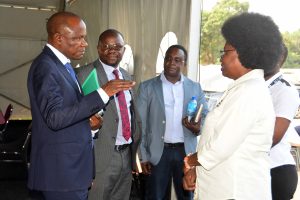
Prof. Hisali acknowledged that Uganda is starting from a very weak base in terms of STI capacity, which makes it even more critical to approach the future with deliberate and focused interventions. While short-term economic gains may be achieved through initiatives such as refining and other industrial projects, he asserted that the country’s sustainable growth and its ultimate transformation hinge solely on its commitment to building a strong foundation in science, technology, and innovation.
Dr. Cosmas Mwikirize, Superintendent for Industrial Value Chain development at the Science, Technology and Innovation Secretariat, highlighted the crucial link between science, technology, innovation (STI), and Uganda’s economic future. He questioned how STI can be more deeply integrated into the country’s development model, noting that while some awareness exists across sectors, fragmented understanding is not enough. He stressed that to realize Uganda’s ambitious goal of becoming Africa’s most scientifically advanced and innovative economy by 2040, a more cohesive and strategic approach is essential.
Dr. Mwikirize emphasized that President Museveni has consistently championed STI as a new frontier of national struggle, describing the economy itself as a “new guerrilla war.” Unlike traditional warfare, he explained, the modern struggle is defined by the global race for resources, technology, markets, and competitive advantage, making science and innovation a national security imperative. “The economy is the new battleground, and if we are to win, science and economics must no longer operate in silos,” he asserted.
Drawing upon global economic thought, he referenced Nobel Prize-winning economists such as Paul Romer, whose pioneering work established that long-term economic growth is not solely driven by labor or capital, but by technological change and innovation
Dr. Mwikirize lamented the persistent disconnect between STI and economic policy in Uganda. He said that while developed countries have deeply embedded STI into their governance frameworks, trade policy, fiscal planning, and industrial strategy, Uganda still treats them as separate streams. He argued that this communication gap has left the intersection between science and economics largely unexplored and misunderstood, resulting in policies that fail to fully harness the transformative potential of innovation.
“Scientists speak in equations and formulas, while economists speak in graphs and GDP. But in the 21st century, these two languages of Science and Economics must learn to converse. Science and the economy must move in sync and it’s only then that we will be able to achieve our bold, strategic agenda,” said Dr. Mwikirize.
He called for diagnostic inquiry on why STI remains underutilized in national development planning. This question, he said, must guide the creation of new institutional mechanisms that embed STI into economic governance. He proposed the development of integrated policy frameworks, cross-sectoral planning bodies, and shared performance indicators that would enable scientists and economists to work collaboratively toward Uganda’s “qualitative leap” in development.

